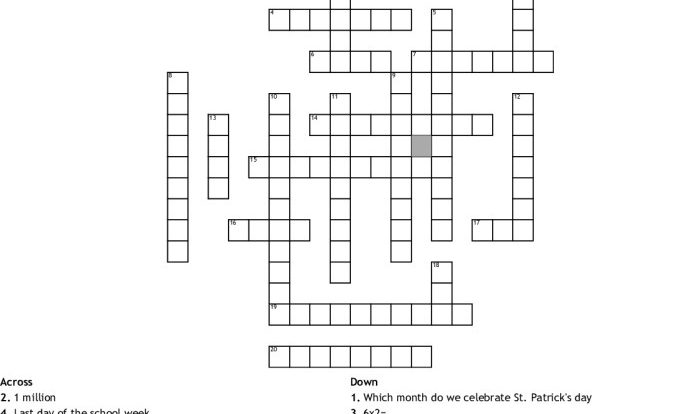Much ado about nothing crossword – Embark on a literary adventure with our exploration of the “Much Ado About Nothing” crossword puzzle. From its origins in Shakespeare’s beloved play to its modern-day incarnation as a beloved brain teaser, this puzzle offers a unique blend of wit, wordplay, and cultural intrigue.
Dive into the historical context of the phrase “Much Ado About Nothing” and its relevance to the crossword puzzle. Explore the play by William Shakespeare and uncover the timeless themes that resonate with crossword enthusiasts.
Introduction
The phrase “Much Ado About Nothing” originates from the title of a comedy play written by William Shakespeare. The play revolves around two main plotlines that involve deception, mistaken identities, and ultimately, a resolution of misunderstandings.
The phrase has since become a popular idiom used to describe situations or events that are exaggerated or made to seem more significant than they actually are. In the context of crossword puzzles, “Much Ado About Nothing” can refer to clues or answers that appear complex or challenging but ultimately have simple solutions.
Popularity of Crossword Puzzles
Crossword puzzles have gained immense popularity over the years due to their engaging nature and mental stimulation. They require a combination of vocabulary, problem-solving skills, and lateral thinking to complete. The puzzles are often published in newspapers, magazines, and online platforms, making them accessible to a wide audience.
The popularity of crossword puzzles can be attributed to their ability to provide entertainment, improve cognitive function, and expand vocabulary. They can also be a social activity, with groups of people working together to solve puzzles or participating in crossword tournaments.
Historical Context
The phrase “Much Ado About Nothing” originates from the title of William Shakespeare’s comedy play of the same name. The play centers around two main plotlines: the courtship of Claudio and Hero and the witty banter between Beatrice and Benedick.
The phrase “Much Ado About Nothing” aptly captures the essence of the play, which explores the themes of love, deception, and the power of words.
Shakespeare’s Play
Written around 1598-1599, “Much Ado About Nothing” is set in Messina, Italy. The play follows the story of Claudio, a young soldier who falls in love with Hero, the daughter of Leonato, the governor of Messina. However, their love is threatened by the scheming of Don John, Claudio’s illegitimate brother, who plots to deceive Claudio into believing that Hero is unfaithful.
Meanwhile, Beatrice and Benedick, two sharp-tongued and witty characters, engage in a battle of wits that eventually leads to their own romantic entanglement.
The play’s title, “Much Ado About Nothing,” reflects the central themes of the play. The phrase suggests that the characters’ actions and emotions are often based on misunderstandings and misinterpretations. The play explores the power of words and the ease with which they can be used to deceive or manipulate others.
Solving Techniques
Tackling crossword puzzles can be a delightful mental exercise, especially when it involves a literary masterpiece like “Much Ado About Nothing.” Here are some strategies to help you unravel the cryptic clues:
Contextual Knowledge
Familiarizing yourself with the play’s characters, plot, and themes will provide valuable context for deciphering clues. Consider the relationships between characters, their motivations, and the events that unfold.
Anagrams and Hidden Words
Crossword puzzles often conceal words within other words. Look for clues that hint at rearranging letters or finding words hidden within longer phrases. For instance, a clue like “A suitor in ‘Much Ado'” could lead you to “BENEDICK” if you rearrange the letters.
Wordplay and Puns
Crossword creators love to play with words. Clues may employ puns, homophones, or double meanings. For example, a clue like “A bit of mischief in ‘Much Ado'” could refer to “TRICK” or “QUIP,” depending on the context.
Themed Clues
Some crossword puzzles may feature a specific theme, such as characters from “Much Ado.” In such cases, clues will likely revolve around the play’s characters and their traits. Pay attention to clues that mention specific characters or their actions.
Cross-Referencing
Don’t be afraid to cross-reference answers as you progress. Sometimes, solving one clue can provide hints for solving others. Use the letters you have filled in to eliminate possibilities and narrow down your choices.
Practice Makes Perfect
The key to mastering crossword puzzles is practice. Engage in regular solving to hone your skills and develop a knack for deciphering even the most enigmatic clues.
Cultural Impact
“Much Ado About Nothing” has had a profound impact on popular culture. Its witty dialogue, memorable characters, and exploration of universal themes have made it a timeless classic.
The phrase “Much Ado About Nothing” has entered everyday language as an idiom to describe situations that are exaggerated or unnecessary. It is often used humorously to poke fun at people who make a big fuss over trivial matters.
Use in Literature and Art
“Much Ado About Nothing” has been adapted numerous times for stage, screen, and opera. Notable adaptations include:
- William Wycherley’s Restoration comedy “The Country Wife” (1675)
- Richard Brinsley Sheridan’s play “The School for Scandal” (1777)
- Giuseppe Verdi’s opera “Un Ballo in Maschera” (1859)
- Kenneth Branagh’s film adaptation (1993)
- Joss Whedon’s modern adaptation “Much Ado About Nothing” (2012)
Influence on Language
“Much Ado About Nothing” has also influenced the English language. The word “malapropism” was coined by Richard Sheridan after Mrs. Malaprop, a character in the play who uses words incorrectly. Other words and phrases that originated in the play include:
- “Benedick the married man”
- “As merry as a grig”
- “To tilt at windmills”
- “A jade’s trick”
Thematic Analysis
Much Ado About Nothing is a play that explores various key themes that are relevant to the crossword puzzle.
These themes are reflected in the clues and answers related to the play, providing insights into the characters, plot, and underlying messages.
Love and Marriage
- The play explores the nature of love and marriage, examining the complexities of relationships and the challenges of finding true love.
- Clues and answers related to this theme include references to the relationships between Beatrice and Benedick, Claudio and Hero, and Don Pedro and Benedick.
Educational Value
Crossword puzzles offer a wealth of educational benefits, particularly when it comes to “Much Ado About Nothing.” These puzzles engage various cognitive skills and promote a deeper understanding of language and literature.
Enhancing Vocabulary
Crosswords introduce players to an array of unfamiliar words, expanding their vocabulary. By solving clues that require specific words, players learn new terms and reinforce their knowledge of existing ones. In the context of “Much Ado About Nothing,” players may encounter Elizabethan-era vocabulary, enriching their understanding of the play’s historical setting.
Improving Problem-Solving Skills, Much ado about nothing crossword
Crosswords challenge players to think critically and solve problems. The clues often require players to decipher hidden meanings, make logical deductions, and connect seemingly unrelated pieces of information. By engaging in this problem-solving process, players develop their analytical and reasoning abilities.
Fostering a Love of Language
Crosswords foster a love of language by exposing players to its intricacies and nuances. The puzzles encourage players to appreciate the beauty and power of words, as well as the ways in which language can be manipulated to create meaning.
Through their interaction with “Much Ado About Nothing,” players gain a deeper appreciation for Shakespeare’s language and the complexities of human communication.
Variations and Adaptations
Shakespeare’s “Much Ado About Nothing” has inspired numerous adaptations and interpretations across various media, each shaping the perception of the phrase in crossword puzzles.
In film, notable adaptations include Kenneth Branagh’s 1993 version, which captures the play’s wit and romantic intrigue, and Joss Whedon’s 2012 modernization, which transposes the story to a contemporary setting.
Television Adaptations
Television adaptations have also played a significant role in popularizing the play. The BBC’s 1984 production, starring Benedict Cumberbatch, is known for its faithful adherence to the original text.
Theater Adaptations
On stage, countless productions of “Much Ado About Nothing” have showcased the play’s timeless themes and characters. Notable adaptations include the Royal Shakespeare Company’s 2007 production, directed by David Tennant, and the Globe Theatre’s 2011 production, featuring Michelle Dockery.
These adaptations have influenced the perception of “Much Ado About Nothing” in crossword puzzles, solidifying the phrase as a reference to trivial matters or exaggerated fuss.
FAQ Guide: Much Ado About Nothing Crossword
What is the origin of the phrase “Much Ado About Nothing”?
The phrase originated from William Shakespeare’s play of the same name, which explores themes of love, deception, and the power of words.
How does the play “Much Ado About Nothing” relate to crossword puzzles?
The play’s witty dialogue and intricate wordplay have inspired many crossword clues, making it a popular source of puzzle material.
What are some strategies for solving crossword puzzles related to “Much Ado About Nothing”?
Look for clues that reference characters, plot points, or famous quotes from the play. Use your knowledge of Shakespearean language and wordplay to decipher the clues.
What is the cultural impact of “Much Ado About Nothing”?
The play has had a profound influence on popular culture, inspiring adaptations in film, television, and theater. The phrase “Much Ado About Nothing” has become synonymous with excessive fuss or drama.

